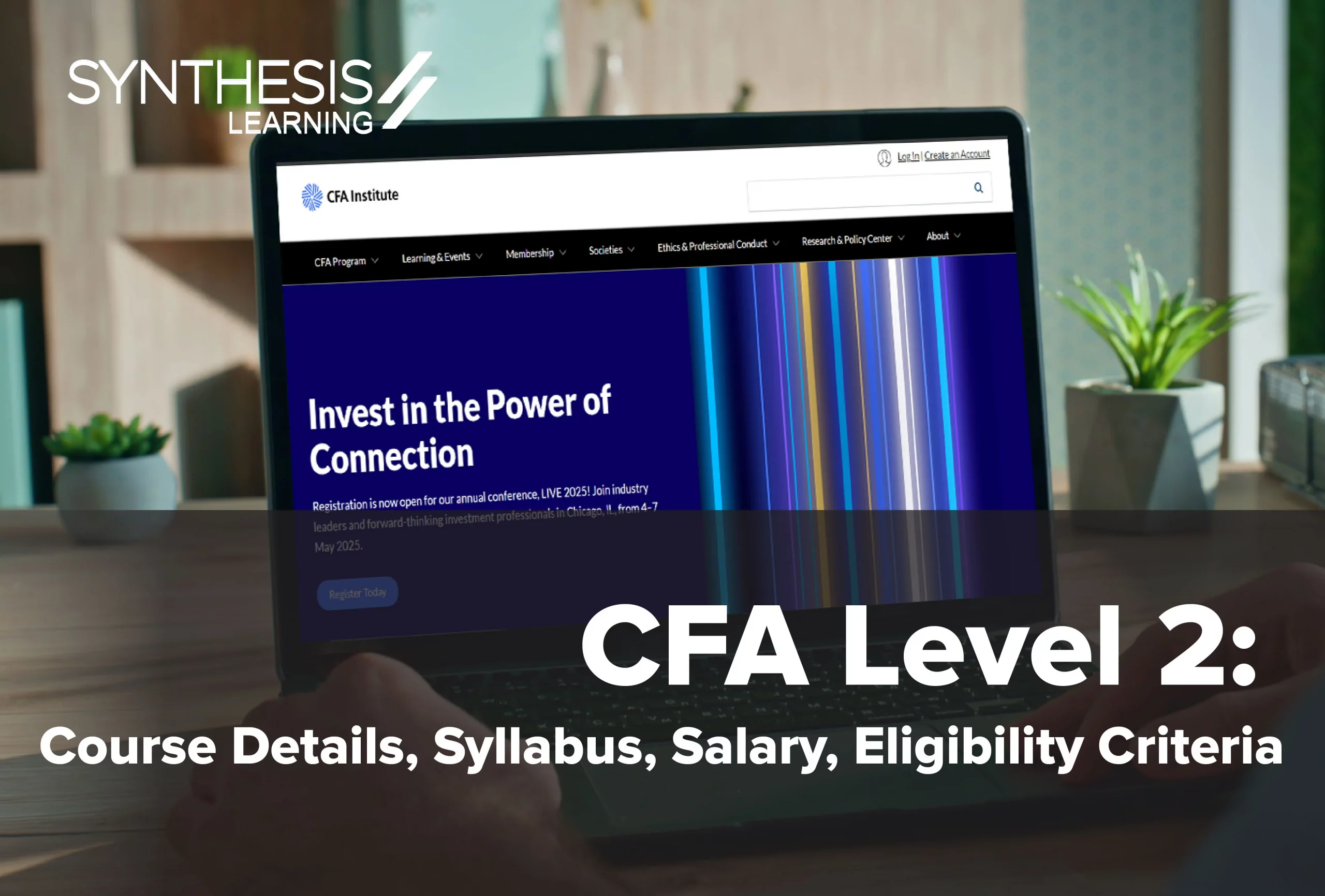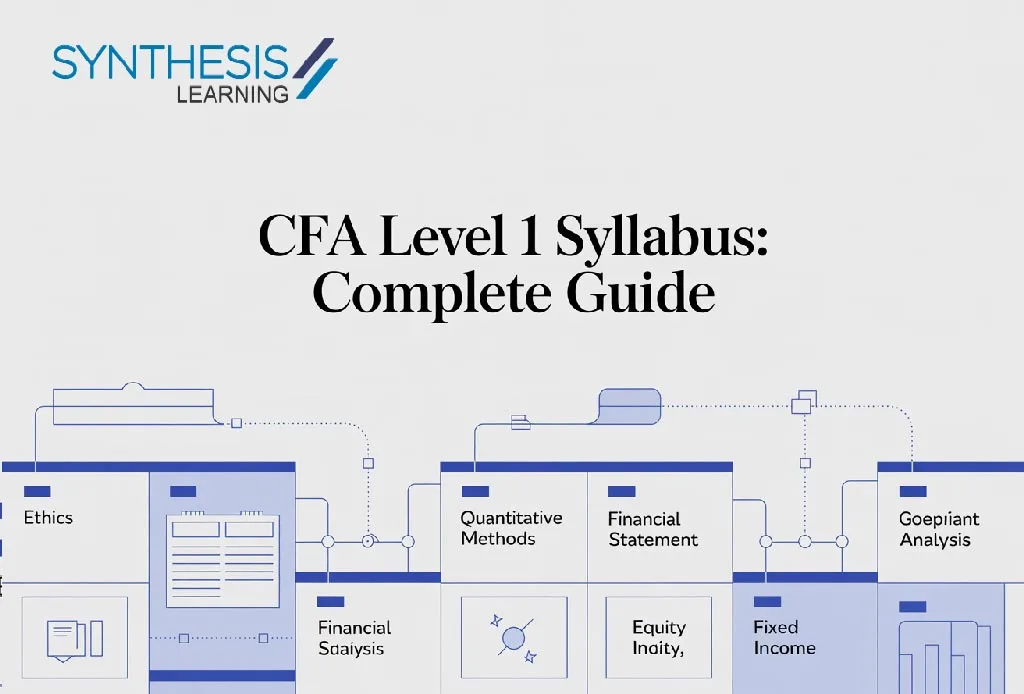The CFA Level 2 exam is a critical milestone for aspiring Chartered Financial Analysts, offering advanced knowledge in investment analysis, valuation, and portfolio management. Designed to test your ability to apply complex financial concepts in real-world scenarios, the CFA Level 2 curriculum covers topics like ethics, economics, financial reporting, and derivatives. With a rigorous exam format and a focus on practical skills, this level prepares you for senior roles in finance, investment banking, and asset management. Whether you’re aiming to boost your career or enhance your expertise, understanding the CFA Level 2 syllabus, eligibility criteria, and exam structure is essential for success.
In this guide, you will get to know everything you need to know about the CFA Level 2 exam, including the CFA Level 2 eligibility criteria, syllabus, exam format, and potential salaries in India. We also explore the newly introduced Practical Skills Module and provide tips to help you ace the exam. Whether you’re transitioning from CFA Level 1 or starting your CFA journey, this blog will equip you with the insights and strategies to navigate the challenges of CFA Level 2 and achieve your career goals.
CFA Level 2: Course Details, Syllabus, Salary, Eligibility Criteria
Introduction
The CFA Level 2 exam is a crucial step for aspiring Chartered Financial Analysts. It focuses on complex financial concepts and applications in depth. The CFA Level 2 2024(2025) syllabus covers advanced investment analysis, valuation, and portfolio management, so this stage demands a thorough understanding and commitment.
In this comprehensive guide by Synthesis Learning, we will learn all the details about the CFA Level 2 2024(2025) course, including the syllabus, CFA Level 2 subject guide, eligibility criteria, exam format, and potential salaries for CFA Level 2 professionals in India. We’ll also compare CFA Level 1 vs. Level 2 to help you understand the progression and differences between these levels.
Table Of Contents
Introduction
What is CFA?
What is a CFA Charter Holder?
CFA Eligibility Criteria
CFA Level 2 Syllabus
CFA Level 2 Paper Pattern
Introduction of Practical Skills Module for CFA Level 2
CFA Level II Exam Tips
CFA Level 2 Fees
CFA Level 2 Salary in India
CFA Level 1 vs Level 2
Why Synthesis Learning Is Your Best Partner To Ace your CFA Course
Conclusion
FAQs
What is CFA?
The Chartered Financial Analyst (CFA) Program is a globally recognised professional certification offered by the CFA Institute USA, a leading international organisation for investment management professionals. Esteemed for its rigour and credibility, the CFA designation is highly respected and trusted within the financial community.
With over six decades of experience, the CFA Institute sets global standards through a focus on integrity and advanced skills in finance and investment. This comprehensive knowledge of the CFA course and skill set is invaluable for a successful career in the finance, investment, and capital markets sectors.
Why Choose the CFA Qualification?
The CFA Qualification establishes you as a stalwart in Investment Analysis and Portfolio Management. Founded in 1963, the CFA Institute defines ethical and professional benchmarks within the investment industry. With over 1,90,000 CFA charter holders across 162 countries, it reflects the program’s universal relevance and prestige.
The Growing Trend of CFA in India
India has the world’s largest pool of Level 1 CFA program candidates, underlining the increasing importance of investment management expertise in the country’s growing financial sector. This comprehensive skill set and knowledge provided by the CFA Program are invaluable for a successful career in finance, investment, and capital markets.
What is a CFA Charter?
A CFA charter is a prestigious designation conferred by the CFA Institute to individuals who have completed all three levels of the CFA exam and acquired the necessary work experience (4000 hours) in the finance industry. Holding a CFA charter signifies a high level of competence and ethical standards in investment management and financial analysis.
The CFA Level 2 exam is a significant milestone in achieving the CFA charter, as it tests advanced topics in finance and investment analysis. Completing CFA Level 2 demonstrates a candidate’s ability to apply complex financial theories and models in real-world scenarios, making them valuable assets to employers.
Now that you have a clear understanding of what the CFA is, let’s walk you through the key details of the CFA Level 2 exam.
CFA Level 2 Syllabus
The CFA Level 2 syllabus is comprehensive and covers various essential topics for advanced financial analysis and investment management. Here are the main areas of focus for CFA Level 2 syllabus, according to the CFA Institute:
Ethical and Professional Standards:
This CFA level 2 subject section emphasises the ethical responsibilities of finance professionals, focusing on integrity and ethical practices in the finance industry.
Quantitative Methods:
Advanced statistical methods and their finance applications include probability distributions, hypothesis testing, and regression analysis.
Economics:
This CFA level 2 subject covers in-depth macroeconomic and microeconomic principles relevant to financial analysis, including economic growth, business cycles, and monetary and fiscal policies.
Financial Reporting and Analysis:
Detailed analysis of financial statements, accounting principles, and financial reporting quality are important CFA Level 2 topics. This section helps candidates interpret and analyse financial reports to make informed investment decisions.
Corporate Finance:
This CFA level 2 subject covers corporate governance, capital budgeting, cost of capital, and capital structure decisions. It also covers mergers and acquisitions, dividend policy, and corporate restructuring.
Equity Investments:
This CFA level 2 subject covers Valuation techniques and analysis of equity securities, focusing on industry and company analysis, equity market valuation, and equity portfolio management strategies.
Fixed Income:
This subject analyses fixed-income securities, manages interest rate risk, and values bonds. Topics in this CFA level 2 subject include the term structure of interest rates, bond pricing, and fixed-income portfolio management.
Derivatives:
Valuation and application of derivative instruments, including forwards, futures, options, and swaps. This section covers derivative pricing models and risk management strategies using derivatives.
Alternative Investments:
This CFA Level 2 topic overviews alternative investment vehicles and their characteristics, including hedge funds, private equity, real estate, commodities, and infrastructure investments.
Portfolio Management and Wealth Planning:
This course covers strategies for managing investment portfolios and planning for wealth management. CFA level 2 topics include portfolio theory, asset allocation, performance measurement, and risk management.
CFA Level 2 Curriculum
The CFA Level 2 curriculum is extensive and structured to provide candidates with a thorough understanding of advanced finance concepts. It is designed to be challenging and integrates theory and application. Topics such as financial analysis, corporate finance, and portfolio management are explored in depth, with many real-world case studies and practical examples included.
One of the unique features of the CFA Level 2 curriculum is its focus on building analytical skills. Candidates are expected to synthesize complex information and apply it to financial decision-making. This focus on real-world application makes the CFA Level 2 curriculum significantly more challenging and practical than Level 1.
CFA Eligibility Criteria
To pursue the CFA Level 2 exam, candidates must meet specific CFA eligibility criteria. First, you must have passed the CFA Level 1 exam, as it is a prerequisite for progressing to Level 2. Additionally, you need a bachelor’s degree or be in the final year of your undergraduate program to meet the CFA exam eligibility criteria. For Indian students, the eligibility criteria for CFA course in India align with global standards, allowing candidates to register for Level 2 while completing their degree. Meeting the CFA Level 2 eligibility criteria ensures you are well-prepared to tackle the advanced curriculum and take a significant step toward earning the prestigious CFA charter.
CFA Level 2 Requirements
To enrol in the CFA Level 2 exam, candidates must meet specific eligibility criteria, including the following CFA Level 2 requirements:
Education Requirement:
To meet the CFA Level 2 eligibility criteria, students can register for the exam during their second year of study and appear for it in their third year. This ensures that candidates progress toward becoming CFA charterholder, following the path set by the CFA program’s requirements.
CFA Level 1 Exam:
Passing the CFA Level 1 exam is the first step toward fulfilling CFA Level 2 eligibility. Only after completing CFA Level 1 can candidates move forward to meet the requirements for CFA Level 2. This exam is a foundational step before advancing to the more complex concepts covered in Level 2.
CFA Level II Exam Format
The CFA Level II exam consists of multiple-choice questions. Familiarising yourself with the CFA level 2 exam format helps with time management and improves performance.
| Category | Details |
| Exam Structure | 22 item sets, each with a vignette and 88 multiple-choice questions. (Note: This structure may change over time.) |
| Exam Duration | 4 hours and 24 minutes, split into two sessions of 2 hours and 12 minutes each, with an optional break in between. |
| Question Format | Each session includes 11 item sets, totaling 22 across the exam. Twenty are scored, and two are trial questions. Each item set’s questions require answers based on the vignette. (The institute may include 6 & 5 or 5 & 6 vignette-supported questions per session at its discretion.) |
Topic Areas
Topics are randomly placed across both sessions. Each vignette starts with a topic and the total point value for that set. For example:
TOPIC: QUANTITATIVE METHODS
TOTAL POINT VALUE: 12 POINTS
CFA Level 2 Exam Date
The CFA Level 2 exam date is held thrice a year, typically in May, August and November. Staying current with the CFA Level 2 exam dates is essential for planning your study schedule and exam preparation. Register early to secure your spot and avoid late registration fees.
CFA Level 2 Fees
The cost of the CFA Level 2 exam includes several components:
Exam Registration Fee: The exam registration fee varies based on the time of registration:
- Early registration: $990
- Standard registration: $1,290
- Rescheduling Fee: $250
CFA Level 2 Results
You will receive your CFA level 2 results and feedback within 5-8 weeks of completing the exam and the Practical Skills Module. This period allows us to review your exam performance and practical skills thoroughly. The CFA level 2 results provide detailed feedback, highlighting your strengths and areas for improvement so you can understand your progress and know what steps to take next in your learning journey.
Now that you clearly understand the CFA Level 2 course details and the commitment it requires, it’s time to look at the exciting prospects that await you. The journey to becoming a CFA charterholder is about gaining knowledge and unlocking greater career opportunities and financial rewards. So, let’s look at the potential CFA level 2 salary you can expect.
CFA Level 2 Salary in India
Achieving CFA Level 2 is more than just an academic milestone – it’s the key to unlocking exciting career opportunities and lucrative compensation in the finance industry. Your earning potential grows as you continue to hone your skills and expertise.
Average Salary:
CFA Level 2 professionals in India can earn between ₹5 to ₹6 Lacs per annum, making it a solid foundation for financial success.
Factors That Influence Earnings:
Experience: More years in the industry can lead to higher pay and better roles.
Job Role: Specialized positions like equity analyst, investment banker, or portfolio manager often offer higher salaries.
Employer Reputation: Working with top-tier financial institutions or global firms can boost your earning prospects significantly.
Introduction of Practical Skills Module for CFA Level 2
In 2024, the CFA Institute introduced a significant change to the CFA Level 2 curriculum: a compulsory Practical Skills Module. This new addition is designed to equip candidates with essential practical skills for workplace applications, enhancing their readiness for real-world challenges.
Overview of the Practical Skills Module
The Practical Skills Module is a self-paced component that takes 10-15 hours to complete. It includes videos, case studies, and interactive content to ensure a comprehensive learning experience. This module aims to bridge the gap between theoretical knowledge and practical application, providing candidates with valuable skills directly applicable to their professional careers.
Module Options
Candidates can choose one of the following four modules, each focusing on a different set of practical skills:
Python Programming Fundamentals:
This module covers Python programming basics, a crucial skill for financial analysts and investment professionals.
Data Science in AI:
This field focuses on applying data science techniques to artificial intelligence, enhancing analytical capabilities.
Analytical Skills:
It aims to sharpen candidates’ analytical thinking and problem-solving abilities through practical case studies and scenarios.
Financial Analysis with Python:
Combines Python programming with financial analysis, offering hands-on experience using Python for financial modelling and data analysis.
Mandatory Completion
Completing the Practical Skills Module is mandatory for all CFA Level 2 candidates. Candidates must finish their chosen module before receiving their exam results. This requirement ensures that all candidates possess advanced theoretical knowledge and practical skills essential in the finance and investment industry.
Importance of the Change
This major change reflects the CFA Institute’s commitment to providing a holistic education that meets the industry’s evolving needs. By integrating practical skills into the curriculum, the CFA program ensures that its candidates are well-prepared for the demands of the workplace and can effectively apply their knowledge in real-world situations.
CFA Level II Exam Tips
Preparing for the CFA Level 2 exam requires a strategic approach to ensure success. Here are some tips to help you excel. By following these tips, you can effectively prepare for the CFA Level 2 exam and increase your chances of success.
Start Early:
Begin your study plan well in advance to cover all the topics thoroughly.
Practice Regularly:
Use practice exams and mock tests to familiarise yourself with the exam format and identify areas for improvement.
Focus on Weak Areas:
Allocate more time to challenging topics to ensure a balanced understanding of the entire syllabus.
Join Study Groups:
Collaborate with fellow candidates to share insights and study strategies.
Use CFA Institute Materials:
Review official CFA Institute materials and resources for accurate and up-to-date information.
CFA Level 1 vs Level 2
Understanding the differences between CFA Level 1 and Level 2 is crucial for candidates progressing through the CFA program:
Content Depth:
CFA Level 1 covers basic concepts and principles, while CFA Level 2 delves into more complex and detailed topics.
Exam Format:
CFA Level 1 consists of multiple-choice questions, whereas CFA Level 2 includes item-set questions that require more in-depth analysis.
Focus Areas:
CFA Level 1 emphasises basic knowledge and comprehension, while CFA Level 2 focuses on the application and analysis of financial concepts.
These differences highlight the progression and increasing complexity as candidates move from CFA Level 1 to Level 2.
Why Synthesis Learning Is Your Best Partner To Ace a CFA Course
At Synthesis Learning, we are dedicated to helping you succeed in the CFA course. Our students achieve top All India and World Ranks, demonstrating our dedication to excellence. Here’s why studying with us can benefit you:
Flexible Learning Modes:
We offer CFA level 2 coaching with classroom, live online, and self-paced learning options to fit your schedule and style.
Expert Tutors:
Learn from experienced professionals who guide you through every step of the CFA curriculum.
Proven Methodology:
Our 4-step approach—Counseling, Coaching, Mentoring, and Placement—ensures comprehensive support throughout your CFA journey.
Conclusion
The CFA Level 2 exam is a pivotal step towards achieving the prestigious CFA charter, offering in-depth knowledge and skills necessary for a successful career in finance. With a comprehensive syllabus, practical exam format, and the potential for attractive salaries, CFA Level 2 prepares candidates for advanced roles in the finance industry.
By understanding the requirements, syllabus, and exam format and following effective preparation tips, you can confidently navigate the CFA Level 2 journey. Partnering with Synthesis Learning for CFA level 2 coaching can further enhance your chances of success, providing the support and resources needed to excel. Check the Official CFA page to learn more about this CFA course.
FAQs
1. How does the exam format for CFA Level 2 differ from CFA Level 1?
The CFA Level 2 exam format tests candidates’ ability to apply their knowledge to practical scenarios. Unlike CFA Level 1, which consists of free-standing multiple-choice questions, the CFA Level 2 exam comprises item sets (vignettes) with multiple-choice questions based on each vignette. This format requires candidates to analyse and interpret data within a contextual framework.
2. How should I approach my exam prep for CFA Level 2?
Effective exam preparation for CFA Level 2 involves a strategic approach. Successful candidates typically report studying over 300 hours. Use CFA Institute materials, including the program curriculum and study sessions, to comprehensively cover all CFA Level 2 topics. Practice with multiple-choice questions and item sets to familiarise yourself with the exam format. Additionally, joining study groups and using exam prep courses can enhance your understanding and retention of the material.
3. What is the course outline for CFA Level 2?
The CFA Level 2 course outline includes the following topics: Ethical and Professional Standards, Quantitative Methods, Economics, Financial Reporting and Analysis, Corporate Finance, Equity Investments, Fixed Income, Derivatives, Alternative Investments, and Portfolio Management and Wealth Planning. Each topic area is designed to provide in-depth knowledge and application skills required for advanced financial analysis and investment management.
4. What’s Included in the CFA Level 2 Syllabus?
The CFA Level 2 syllabus covers various financial topics, including financial reporting, portfolio management, equity analysis, and alternative investments. As you prepare, ensure you understand each topic’s weightage to focus on areas for improvement.
5. When are the exam dates for CFA Level 2 in 2024?
Candidates should refer to the CFA Institute’s official website for the most up-to-date information on exam dates and registration deadlines for 2024.
6. What is the importance of the CFA Level 2 certification for professionals?
The CFA Level 2 certification is crucial for professionals advancing in the finance and investment industry. It demonstrates high competence and ethical standards, providing a competitive edge in the job market. CFA Level 2 certification is valued globally, opening doors to senior and executive positions in investment management, risk management, asset management, and other finance-related roles.
7. What Can I Expect as a CFA Level 2 Salary?
With CFA Level 2, professionals can earn a higher salary, especially in investment banking, asset management, and corporate finance. The CFA Level 2 salary typically varies depending on your industry, experience, and location, but you can expect an increase compared to entry-level positions.
8. What Are the CFA Level 2 Fees?
The CFA Level 2 fees depend on when you register. Early registration is cheaper, while late registration carries a higher fee. In addition to the exam fees, you should consider costs for study materials, courses, and other exam-related expenses.
9. What Are the CFA Level 2 Fees in Indian Rupees?
The CFA Level 2 fees in Indian Rupees vary depending on the registration timing. Early registration is the most affordable, while late registration is more expensive. Be sure to keep track of registration deadlines and plan accordingly.




